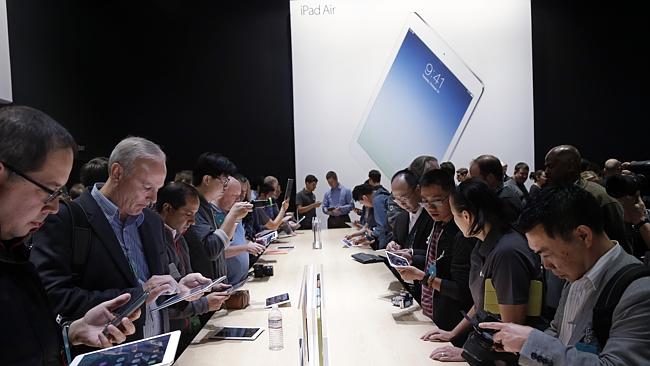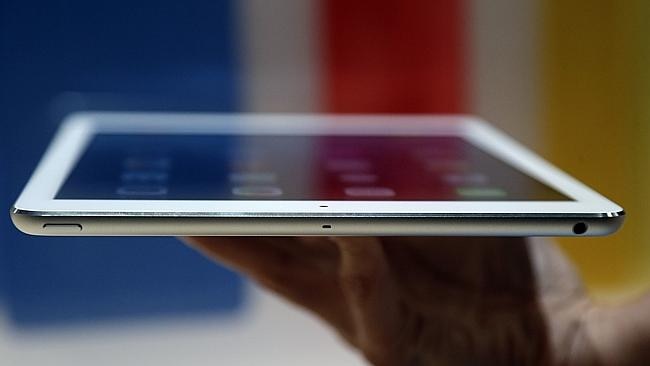Apple light on innovation when it comes to its latest range of iPad products
Apple is betting on modest improvements to existing products rather than something completely new in its latest range of iPads

With the launch of Apple's new range of iPads, the battle for tablet dominance has changed. One thing has become clear: it's not an equal fight.
It's not that Apple CEO Tim Cook and his team are fighting dirty nor battling opponents above their weight.
It's that while their opponents are swinging with new tactics and tablets of all shapes, sizes and styles, Apple is continuing to punch away with the same routine.
Thinner, faster, lighter, says Mr Cook, beats counterpunches of cheaper, hybrid and new offerings.
Earlier this year, Apple fans were predicting big things for the company, including an internet-connected television and a smartwatch. But with no sign of either, critics are calling the small improvements in this year's iPhone and iPad releases a sign the company has lost its innovative edge.
Gartner research vice-president Van Baker, who went to Apple's iPad launch at the Yerba Buena Centre for the Arts in San Francisco, says the pressure to innovate was reasonable, but Apple is within its "window" of expectation given the gaps between the launch of the iPod (2001), iPhone (2007) and iPad (2010).
"Does Apple need to innovate? Yes they absolutely do," Mr Baker says. "Do they need to bring out a new category of products that nobody knew they needed until Apple invented it? Yes, but they're still within a reasonable amount of time."
Last week was the 12th anniversary of the iPod's launch. News reports from the time show some analysts compared it with similar production from Creative Labs and Sony and found Apple wasn't delivering enough choice in its product range and was pitching its product too high. It's a different product and a different time, butThe same criticisms are being pitched at the iPhone and iPad range.
The new iPad Mini with 7.9-inch, 324ppi Retina display, for example, will go on sale in Australia starting from $479, compared with the Google Nexus 7 with a 7-inch, 344ppi screen that costs only $299 in Australia.
Patrick Moorhead, of Moor Insights and Strategy, says Apple has a history of innovation, but financial analysts are "questioning the extent of those breakthroughs".
That each generation of the iPad is an incremental increase is clear. What is not clear for consumers is whether each increment justifies an upgrade.
Localytics research shows the iPad 2 still makes up almost 40 per cent of Apple's tablet base, with the new Retina screen, 4G connectivity and thinner, faster and lighter forms not a sufficient catalyst for change.
Regardless, Apple is clearly betting that form is enough to sell its new iPad Air. The iPad Air is the fastest, most powerful iPad yet, but Apple's big message is that it's lighter and easier to hold.
The telling point at its launch was a photo of a person standing on public transport holding the 9.7-inch screen iPad Air comfortably in one hand.
Mr Cook displayed an impressive, if uncredited pie chart showing iPads made up 81 per cent of tablets used. But what would not look so impressive to Apple executives would berecent IDC figures of worldwide tablet shipments show Apple had a 32.4 per cent share in the second quarter of 2013, almost half the 60.3 per cent it held a year ago.

Gartner's analysis of the change in the past three years in the tablet market would be similarly distressing for Apple. Back shows in 2011, Apple held 65.3 per cent of the tablet market, compared with 29.5 per cent for its main rival, Google's Android.
By next year, Gartner predicts Google's sliceof the market will reach 49.4 per cent, ahead of Apple with 47.2 per cent. The change reflects a similar move in the smartphone market. The companies might be using different tactics but the intensity of the tablet fight is clear, as is Mr Cook about Apple's strategy.
"Our competition is different: They're confused," he says. "They chased after netbooks. Now they're trying to make PCs into tablets and tablets into PCs. Who knows what they'll do next? I can't answer that, but I can tell you we're focused."
THE WRITER TRAVELLED TO SAN FRANCISCO AS A GUEST OF APPLE.



